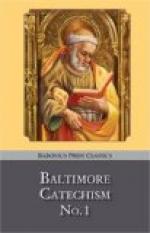259. Q. When are we bound to receive Holy Communion? A. We are bound to receive Holy Communion, under pain of mortal sin, during the Easter time and when in danger of death.
260. Q. Is it well to receive Holy Communion often? A. It is well to receive Holy Communion often, as nothing is a greater aid to a holy life than often to receive the Author of all grace and the Source of all good.
261. Q. What should we do after Holy Communion? A. After Holy Communion we should spend some time in adoring our Lord, in thanking Him for the grace we have received, and in asking Him for the blessings we need.
LESSON TWENTY-FOURTH ON THE SACRIFICE OF THE MASS
262. Q. When and where are the bread and wine changed into the body and blood of Christ? A. The bread and wine are changed into the body and blood of Christ at the Consecration in the Mass.
263. Q. What is the Mass? A. The Mass is the unbloody sacrifice of the body and blood of Christ.
264. Q. What is a sacrifice? A. A sacrifice is the offering of an object by a priest to God alone, and the consuming of it to acknowledge that He is the Creator and Lord of all things.
265. Q. Is the Mass the same sacrifice as that of the Cross? A. The Mass is the same sacrifice as that of the Cross.
266. Q. How is the Mass the same sacrifice as that of the Cross? A. The Mass is the same sacrifice as that of the Cross because the offering and the priest are the same—Christ our Blessed Lord; and the ends for which the sacrifice of the Mass is offered are the same as those of the sacrifice of the Cross.
267. Q. What were the ends for which the sacrifice of the Cross was offered? A. The ends for which the sacrifice of the Cross was offered were: 1st, To honor and glorify God; 2d, To thank Him for all the graces bestowed on the whole world; 3d, To satisfy God’s justice for the sins of men; 4th, To obtain all graces and blessings.
268. Q. Is there any difference between the sacrifice of the Cross and the sacrifice of the Mass? A. Yes; the manner in which the sacrifice is offered is different. On the Cross Christ really shed His blood and was really slain; in the Mass there is no real shedding of blood nor real death, because Christ can die no more; but the sacrifice of the Mass, through the separate consecration of the bread and the wine, represents His death on the Cross.
269. Q. How should we assist at Mass? A. We should assist at Mass with great interior recollection and piety and with every outward mark of respect and devotion.
270. Q. Which is the best manner of hearing Mass? A. The best manner of hearing Mass is to offer it to God with the priest for the same purpose for which it is said, to meditate on Christ’s sufferings and death, and to go to Holy Communion.




